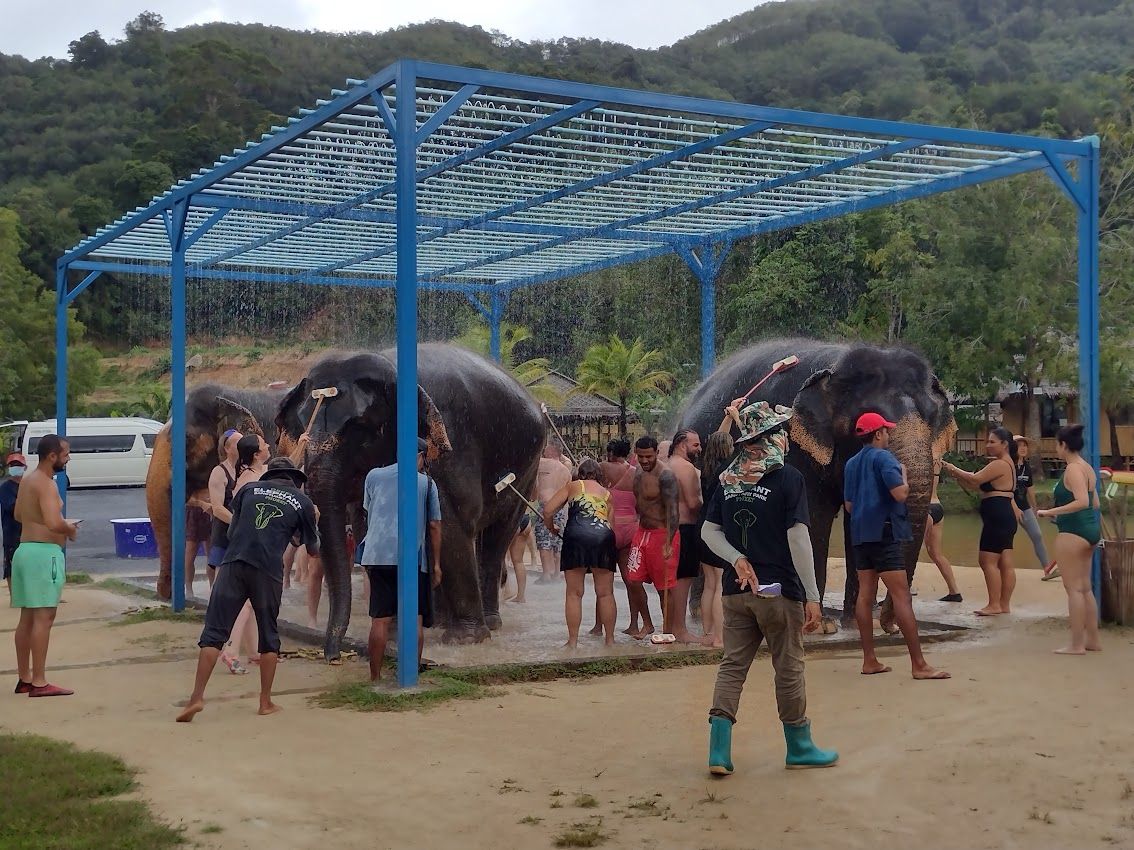
It started with a hand. Or in this case, a trunk and a hand.
Urs slipped up to my right shoulder, and with the utmost of gentility explained that I had just done something not only dangerous but also foolish. That's bad enough, but since I was a guest at his facility, I had just trespassed on his generosity. I apologized profusely, he accepted, and I was far more mindful after that. Whew.
Not everyone would have been that kind. In some cases I'd have been tossed, not without cause.
However, that's Urs Fehr. As the Director of Green Elephant Sanctuary, he has a way about him, which is one reason that his organization is thriving even after having had to shut down for two years due to Covid. A retired Swiss security expert, a while back, Urs fell in love with elephants. That love has led him to do with his facility what many if not most other "sanctuaries" cannot or will not do: he really does rescue abused elephants.
While tourists pay the bills, the way he goes about this business is, at least to my mind, how it could best be done.
The incident with the trunk and the hand is simple to relate but deeply complex in nature. At one point, Urs was involved with a mother and new baby, providing food and interacting with them. Elephant mothers can be extremely aggressive and protective for good reason, and this mother was no different.
However after about three weeks, she reached over with her trunk, took Urs' hand and laid it on her baby.
Suffice it to say the moment was transformative. Urs was committed, and he set to work educating himself about the plight of the Asian elephant, about which most Westerners know very little.
In fact, that lack of education is part of the problem, and it's exploited by too many people who run these parks. Simply by using the term "sanctuary," tourists are lulled into believing that whichever park they visit is a fine retirement home.
However that is most often not the case. Poor practices and abuses are widespread, as Urs found out.
This feature article provides plenty of his backstory:
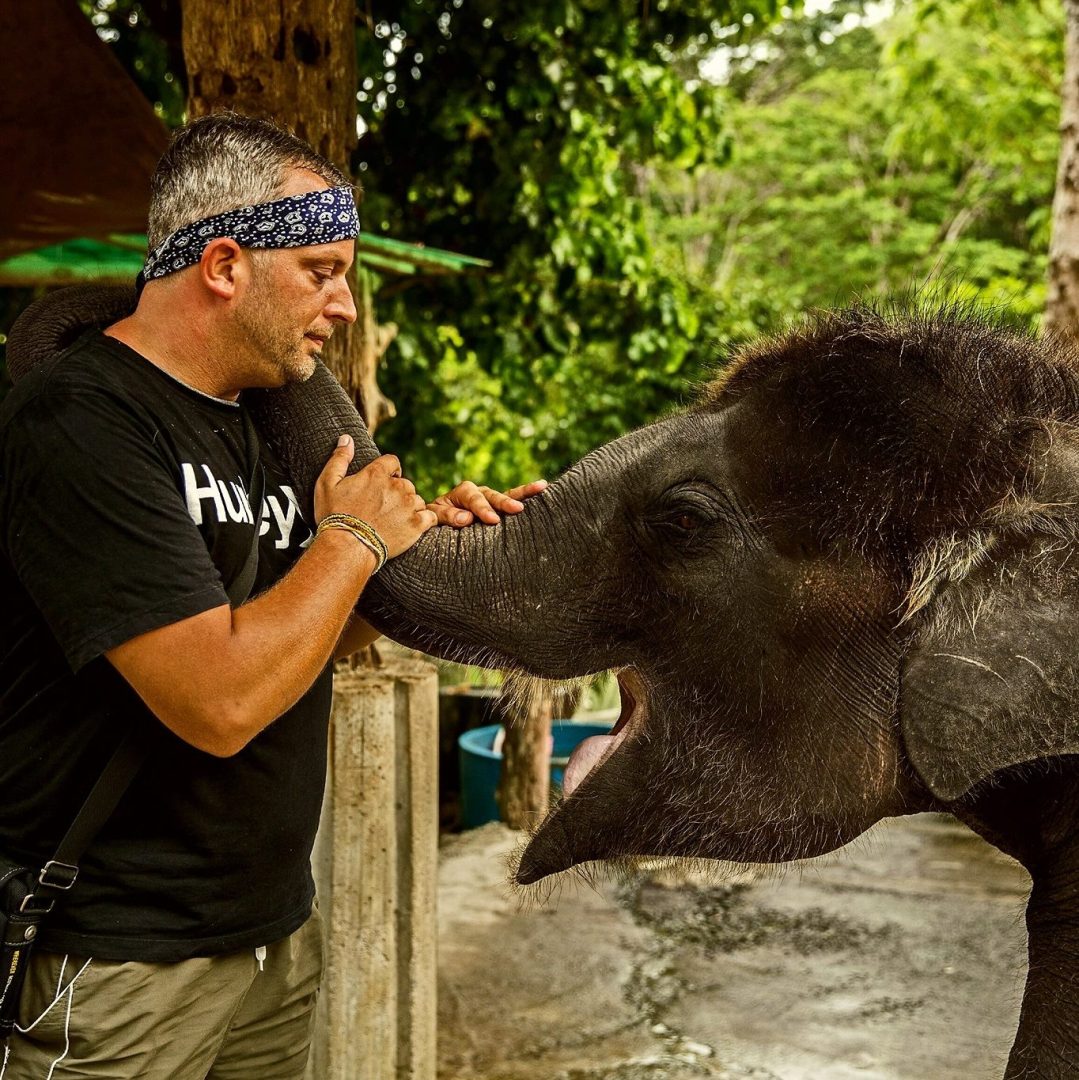
While the article glosses this part over, Urs told me that men were sent to intimidate him using "long knives," giving him the once-over stink-eye and making the threat very clear. It didn't stop there. Another brandished a gun. Don't leave, don't live.
Urs doesn't intimidate easily. As a result, and also because he put his shoulder into getting to know people locally, getting engaged in his community and making friends, he went ahead and built Green Elephant. As a "farang" or white outsider, this can be monumentally challenging. Negotiating all the challenges, including the occasional threat to one's life, found Urs up to the task.
It helps that he just happens to also have an excellent flair for marketing, how to use Google and other sophisticated methods to get the word out. In today's world, negotiating a heavily over-populated space where pretty my much everyone claims the same thing, outright lifts copy from others' successful site to hijack customers, you have to be incredibly savvy.
As a result, Green Elephant opened in 2018 with just a few elephants and began turning a profit in no time. Urs had sold all he had, and committed to his endeavor completely.
Then, two years into his business, Covid. The nation shut down. Urs and his Thai girlfriend sold their lovely home, moved to far more modest digs, and spent close to forty million baht, or $1,060,000 to keep all his people on the payroll. And the elephants safe, fed and happy.
That's what commitment looks like.
He's already seeing his numbers returning.
By the time I reached Green Elephant Sanctuary I'd already seen five other parks. The first was a total bust, but the experiences got better with each new facility. Also, I was on a steep learning curve, still am (always will be).
What I judged adequate three weeks ago, well. Not now. There's more perspective, and as with all good education, I am learning to ask better questions, which will then lead to asking even better questions. Urs' success offers some important lessons in why so many operators do not provide good experiences for the elephant, but instead commoditize the creature for profit.
What challenges a local operator is sheer cost. The cost of the elephant itself, feeding them (they eat 16-18 hours a day), housing them, paying and training good mahouts (which can make or break an outfit by breaking an elephant through rough treatment).
Here are a few points where Urs has chosen the high road. Green Elephant brings people in and ensures that they understand the importance of sanitation, requiring that we thoroughly wash our hands and arms. Our guides did an excellent safety briefing, which was largely missing from all my previous visits to other sites. This time, however, we were told why.
When elephants ingest chemicals off our skin and bodies, such as sunscreen, it can give them diarrhea. If a baby elephant gets diarrhea, it can die within 24 hours, which is something that likely none of the tourist brochures bother to explain when they show baby ellies bombing tourists. I admit to being charmed by the idea until I learned about this. In our desire to be charmed we can do terrible harm, so such sensitivity to animal safety was a breath of fresh air.
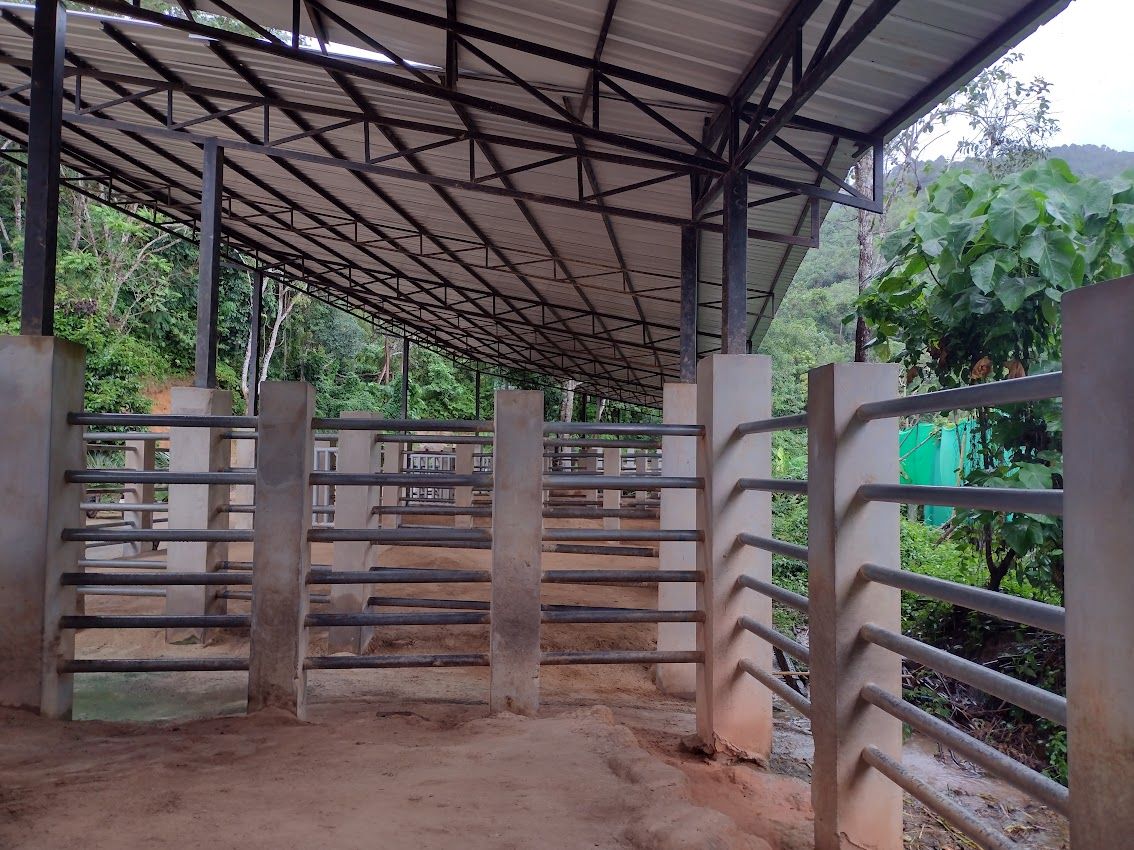
Our group was shown the night-time enclosures for the elephants which are for their safety. Especially this close to the city, elephants can't be left in the forest to forage at night. Domesticated beasts like these are highly likely to seek out people's gardens, which can end in tragedy for all involved. The big enclosures are provided for their safety, and nowhere, as I saw elsewhere, are the elephants chained to a tree or a stake in the ground.
The mahouts are housed in well-made bamboo huts right across the path. First, they can be locked. Second, if their charge is having a bad night, they're right there. Especially for traumatized rescues, the safety of a consistent familiar face allows them to calm down. Some can't even join the herd, much less receive human visitors.
Urs explained that their hearing is almost as remarkable as their sense of smell. They truly are amazing animals, which is why the need to find a bigger location, buy more elephants who desperately need a safe home has now become an imperative.
That's easier said than done. With all the development, pressures on wildlands even to set up a sanctuary is making this difficult. Forget about wildlands which can support a herd away from human contact. You can see the problem, and it's getting worse.
Most of the two hours we're allowed to be around these animals is similar to other places. What's different are the eagle eyes of those making sure someone doesn't do something dumb (like I did) and if so, is given the chance to fix it. You can feed, splash, rub mud on them, wash it off, like everywhere else.
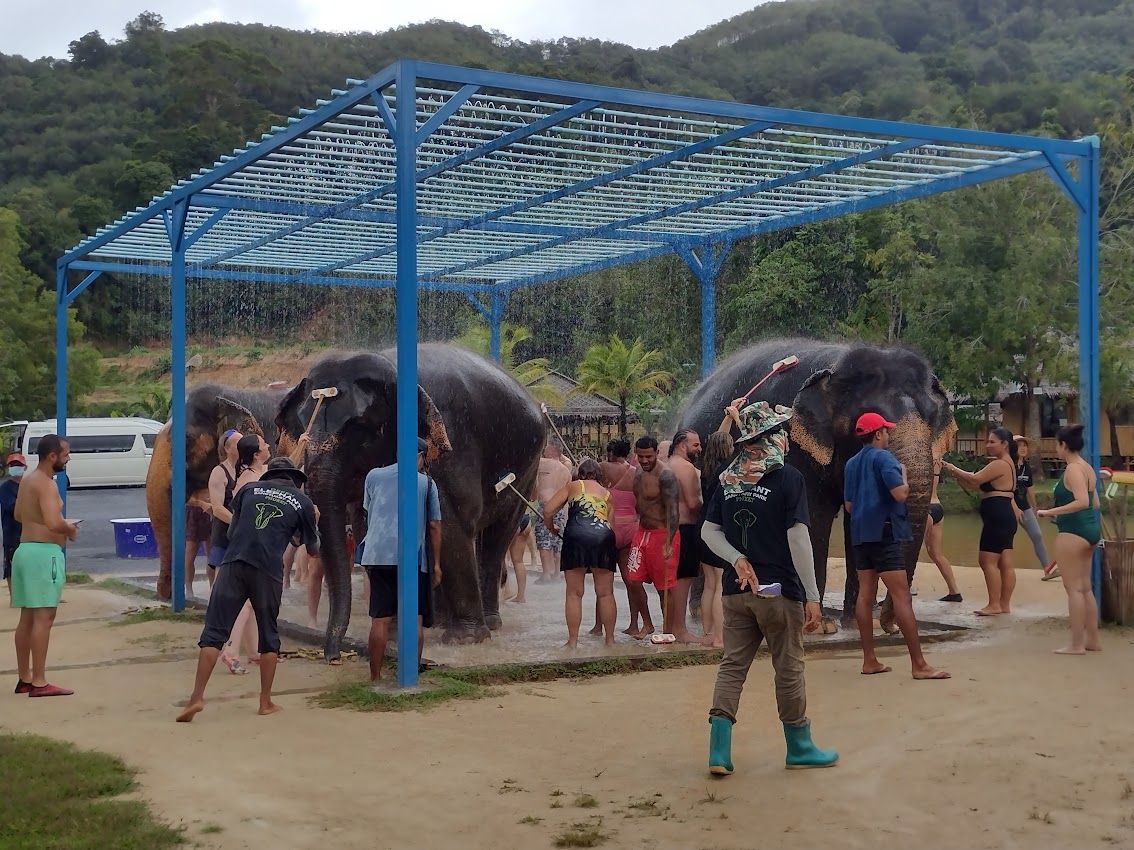
What's different is the final touch. Guest and elephant alike head underneath the overhead showers while the mahouts direct those with long-handled brushes to get rid of all the grit.
In about three days, everyone gets copies of the photos which were taken by employees. With the exception of this writer, at least, that means that the guests are where they need to be and in line of sight of those who need to keep us safe.
At the end of our two hours, we can shower (or not) and then we're fed. We've already been asked about allergies, just in case, and the food appealed to everyone. There was a lot of it too.
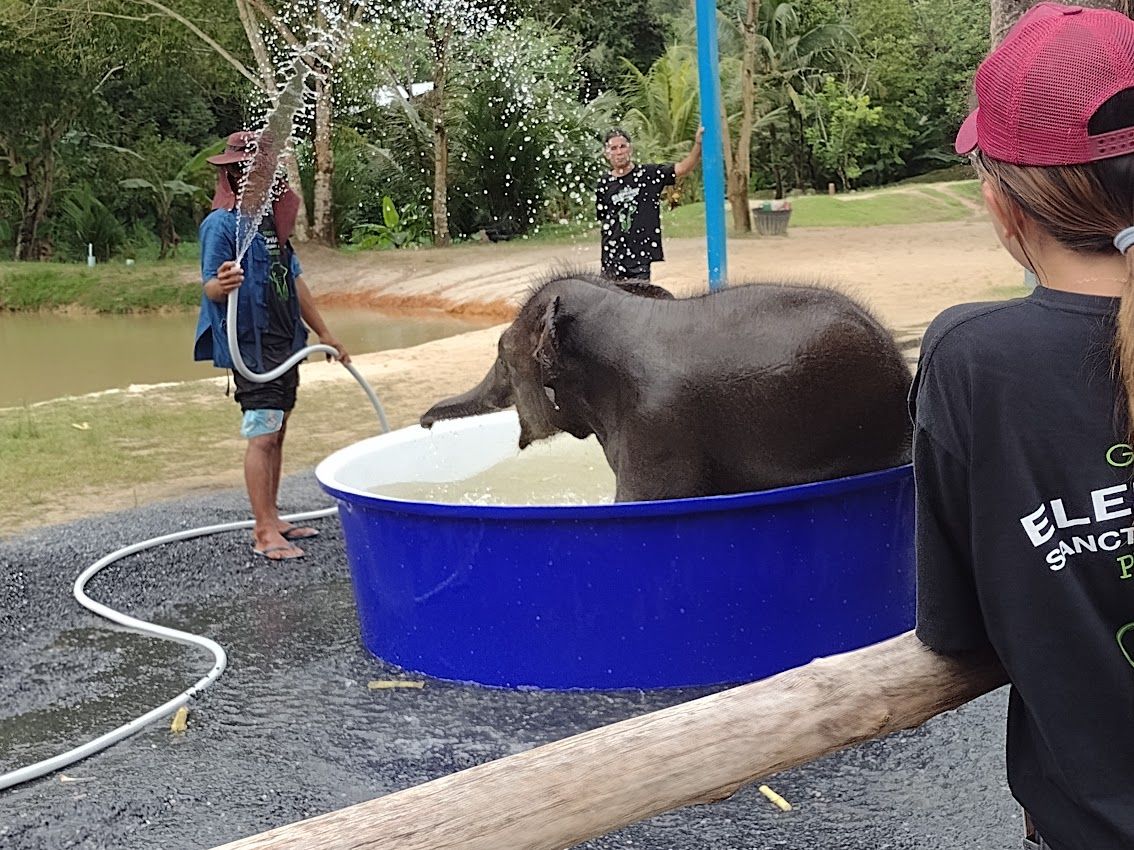
Finally, the treat we didn't know was coming: the mother and baby were brought out for their own shower, behind a protective fence. We were instructed to step back immediately if the rambunctious little boy came our way (he did, a lot). His handler played with him with a hose while he ran dizzying circles in a big tub.
Watching him play, I was reminded of a funny-VERY-sad story told me by one of the senior managers at Sheldrick Wildlife Trust. They offer the chance to sponsor a baby elephant, or a rhino, for a year for the princely sum of fifty dollars (it may have gone up). One family in Manhattan sent the fifty dollars, then a few weeks later, sent the following query (in all seriousness, NOT a joke):
"When do we get our baby elephant?"
You and I could unpack this for days, weeks, years. I won't.
This is where we are: animals are commodities to be bought, sold, and discarded when suddenly inconvenient.
I'd say 18 hours a day of food with the concomitant poop on your Oriental rug are likely to cause said family to consider baby ellie very inconvenient.
Outfits like Green Elephant are rare in that they do what they say they do. I got to spend about an hour with Urs so that I could flesh out the story a bit more. Having heard it, today I sent introductory emails to two very powerful Kenya-based professionals whose long experience and similar commitment might be of value to Urs.
As well, his commitment, energy and drive are much-needed in a world so swiftly losing its great mammals. Founders die and new generations take up the work.
That work never stops. Where we spend our tourist dollars matters.
At least here, they truly do have sanctuary.
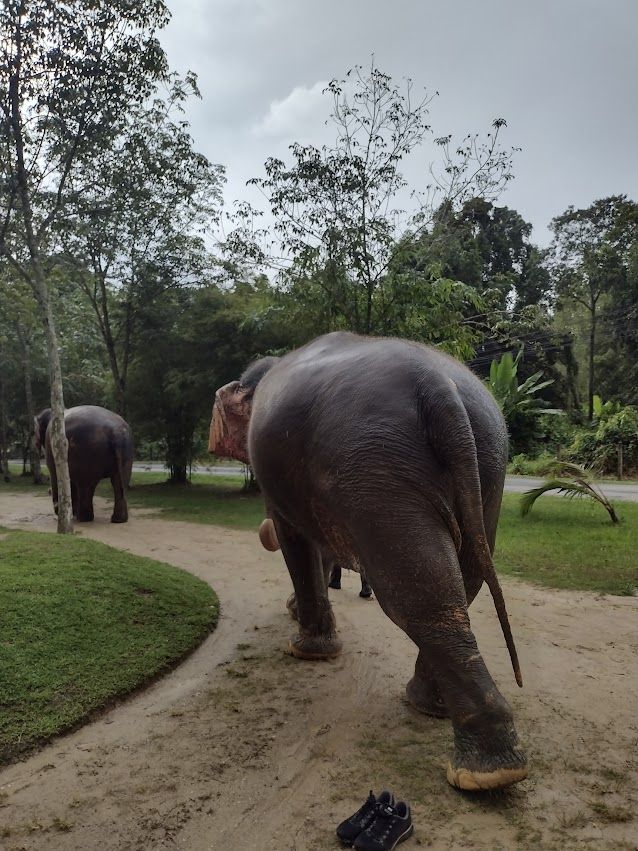
Dear Reader: If you come to Thailand and are determined to spend time with these animals, for their sake please do your due diligence. Lots of five star Trip Advisor reviews do not always translate to good treatment. Everyone and his brother, sister aunt, uncle and proctologist has a friend in the business.
Please ask the hard questions. If you see them being ridden, protest and leave. Most particularly if you see a brochure with people on a metal cage on their backs, BACK AWAY. An ellie can handle ten percent of its body weight right behind the ears. Doesn't mean they should. It means they're still working, not retired.
Those contraptions can do damage. That means you and I are part of the problem if we buy tickets to the elephant shows and such rides.
A selfie taken with a happy baby to get millions of likes at the risk of killing the baby? Is that really worth it? It takes two years to gestate one of those sweeties. And just a few seconds of immense selfishness to end that life.
I can't answer that for you. But if you really really care, please beware.
***
Dear Walkabout Saga Reader:
If my work appeals to you, may I kindly invite you to consider joining those Patreon supporters whose generosity keeps the gas in my tank as it were. Those supporters get to dictate my content, we engage as a community, and this website and its content acts in service to our collective best selves. Top supporters get exclusive content unavailable elsewhere, and a lot of personal attention.
You can explore that option here.
However you decide to partake of my writing, thank you.

Comments powered by Talkyard.